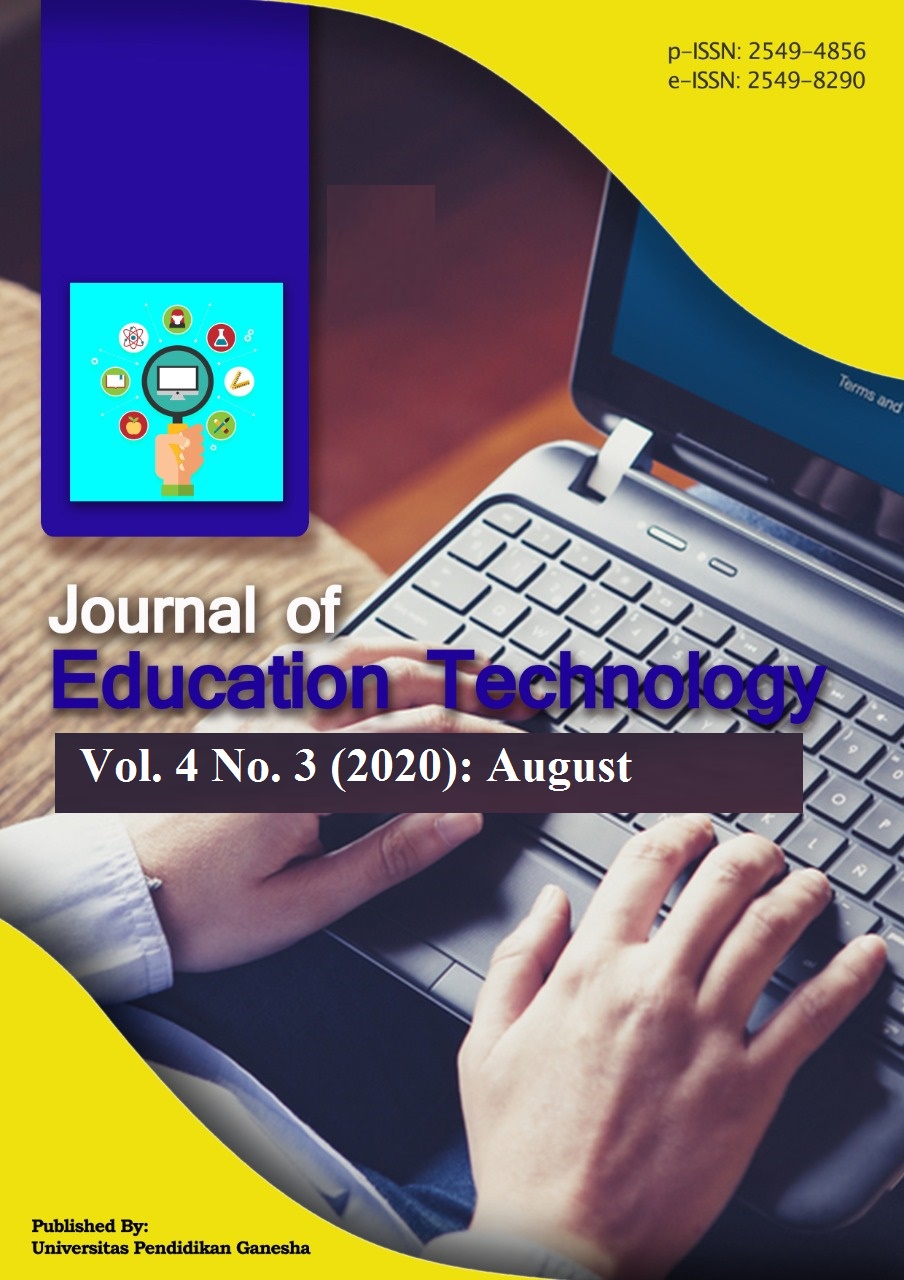The Positive Impact of SFE Learning Model Assisted with Mind mapping Media Toward Students’ Knowledge Competence in Science
DOI:
https://doi.org/10.23887/jet.v4i3.27098Keywords:
SFE learning model, mind mapping, science knowledge competenciesAbstract
The problem in the low science knowledge competence in fifth-grade elementary school students at Gugus VIII, Kecamatan Kintamani, is the main research problem. The students' low science knowledge competence occurs because learning is still a teacher centre and the minimal use of learning media. Therefore, this study was conducted to analyse the effect of the student facilitator and explain (SFE) learning model assisted by Mind mapping media on science knowledge competence at fifth-grade elementary school students. This type research is a quasi-experimental design with Non-Equivalent Post-test Only Control Group Design. The population in this study were all fifth grade SD Gugus VIII Kecamatan Kintamani, consisted of 111 students. The sample in this study was taken by side random technique, it was found that the fifth grade SD Negeri Abangsongan as an experimental group which consisted of 26 students and the fifth grade of SD Negeri Suter as a control group which consisted of 25 students. Data collected used the science knowledge competency test method in multiple-choice objective tests. Science knowledge competency data analysed using descriptive statistical analysis techniques and inferential statistics with 5%. Significance level. From the data analysis results, tcount 5.76> ttable 2.00. So that H0 rejected. It means that there is a significant effect of the SFE learning model assisted by Mind mapping media on the science knowledge competence atfifth-grade elementary school students in Gugus VIII, Kecamatan Kintamani. For research that has the same variables, the results can be used as a study of relevant research.
References
Agung, A. G. (2016). Statistik Dasar untuk Pendidikan. Aditya Media Pubishing.
Berlin, S., & Kurniasih, I. (2015). Ragam Pengembangan Model Pembelajaran Untuk Peningkatan Profesionalitas Guru (A. Jay (ed.); I). Kata Pena.
Fauzi, D. R., Kusmariyatni, N. N., & Mahadewi, L. P. P. (2016). Pengaruh Model Pembelajaran SFAE Bermediakan Mind Mapping Terhadap Hasil Belajar PKn Siswa. E-Journal PGSD Universitas Pendidikan Ganesha, 6(3), 1–11. https://doi.org/http://dx.doi.org/10.23887/jjpgsd.v4i3.8648
Hendawati, Y., Putri, S. U., Pratomo, S., & Widianingsih, F. (2018). Penerapan Model Mind Mapping Untuk Meningkatkan Penguasaan Konsep IPA Di Sekolah Dasar. Metodik Didaktik, 13(2), 113–124. https://doi.org/https://doi.org/10.17509/md.v13i2.9498
Hendrawan, G. (2017). Pengaruh Model Pembelajaran SAVI Berbasis Mind Mapping Terhadap Motivasi Belajar IPS Di SD. Jurnal Mimbar PGSD Universitas Pendidikan Ganesha, 6(1).
Huda, M. (2013). Model-Model Pengajaran dan Pembelajaran. Pustaka Belajar.
Lestari, dkk I. (2014). Pengaruh Model Pembelajaran Student Facilitator And Explaining Terhadap Hasil Belajar IPA Kelas V. Jurnal Mimbar PGSD Universitas Pendidikan Ganesha, 2(1).
Masnun, H. M. (2016). Penerapan Pendekatan Saintifik Dalam Pembelajaran Tematik. Al Ibtida, 3(1), 93–115. https://doi.org/https://doi.org/10.24235/al.ibtida.snj.v3i1.590
Mudarini, dkk H. (2017). Pengaruh Pembelajaran Student Facilitator And Explaining (SFAE) Berbantuan Media Kartu Terhadap Hasil Belajar IPA Siswa. Jurnal Mimbar PGSD Universitas Pendidikan Ganesha, 5(2), 1–11.
Mulyadin. (2016). Implementasi Kebijakan Pembelajaran Tematik Terpadu Kurikulum 2013 Di SDN Kauman 1 Malang Dan SD Muhammadiyah 1 Malang. Jurnal Edutama, 3(2), 31–48. https://doi.org/http://dx.doi.org/10.30734/jpe.v3i2.35
Pujiastuti, I. (2017). Pengaruh Metode Diskusi Berbantuan Mind Mapping Terhadap Hasil Belajar Mahasiswa PBSI Pada Mata Kuliah Semantik. Bahastra, 37(2), 148–155. https://doi.org/http://dx.doi.org/10.26555/bahastra.v37i2.6855
Putra, P. (2017). Bangun, Penerapan Pendekatan Inkuiri Pada Mata Pelajaran IPA Untuk Mengembangkan Karakter Siswa Di SDN 01 Kota. Jurnal Madrasah Ibtidaiyah, 3(1), 28–47. https://doi.org/http://dx.doi.org/10.31602/muallimuna.v3i1.953
Ratnani, D. A. S. (2019). Peningkatan Kreativitas Siswa SMP Wisata Sanur Melalui Penerapan Model Pembelajaran Group Investigation (GI) Berbasis Media Mind Mapping. Biodik: Jurnal Ilmiah Pendidikan Biologi, 5(2), 150–163. https://doi.org/https://doi.org/10.22437/bio.v5i2.6416
Samatowa, Us. (2010). Pembelajaran IPA di Sekolah Dasar. PT Indeks.
Shoimin, A. (2014). 68 Model Pembelajaran Inovatif dalam Kurikulum 2013. AR-Ruzz Media.
Sophuan. (2018). Peningkatkan Keterampilan Mengajar Guru SMP Mata Pelajaran IPA Dalam Menerapkan Pendekatan Saintifik. Tadrib, 4(2), 335–355. https://doi.org/https://doi.org/10.19109/tadrib.v4i2.2860
Sujuni, A., Jamal, M. A., & Suyidno. (2014). Meningkatkan Hasil Belajar Siswa Melalui Model Pembelajaran Kooperatif Tipe Student Facilitator And Explaining. Berkala Ilmiah Pendidikan Fisika, 2(1), 31–42. https://doi.org/http://dx.doi.org/10.20527/bipf.v2i1.813
Susanto, F., Suyitno, H., & Arifudin, R. (2014). Komparasi Model Pembelajaran TPS Dan SFE Terhadap Kemampuan Pemahaman Konsep. Unnes Journal Of Mathematics Education, 3(1), 63–68. https://doi.org/https://doi.org/10.15294/ujme.v3i1.3438
Widyawati, S. (2016). Eksperimentasi Model Pembelajaran Student Facilitator And Explaining (SFE) Terhadap Hasil Belajar Ditinjau Dari Kecerdasan Linguistik. Al-Jabar: Jurnal Pendidikan Matematika, 7(2), 267–274. https://doi.org/https://doi.org/10.24042/ajpm.v7i2.41
Wiratningsih, dkk A. (2014). Pengaruh Student Facilitator And Explaining Berbantuan Peta Konsep Terhadap Hasil Belajar PKn Kelas V SD Gugus I gusti Ngurah Rai. Jurnal Mimbar PGSD Universitas Pendidikan Ganesha, 2(1).
Downloads
Published
How to Cite
Issue
Section
License
Authors who publish with the Journal of Education Technology agree to the following terms:
- Authors retain copyright and grant the journal the right of first publication with the work simultaneously licensed under a Creative Commons Attribution License (CC BY-SA 4.0) that allows others to share the work with an acknowledgment of the work's authorship and initial publication in this journal.
- Authors are able to enter into separate, additional contractual arrangements for the non-exclusive distribution of the journal's published version of the work (e.g., post it to an institutional repository or publish it in a book), with an acknowledgment of its initial publication in this journal.
- Authors are permitted and encouraged to post their work online (e.g., in institutional repositories or on their website) prior to and during the submission process, as it can lead to productive exchanges, as well as earlier and greater citation of published work. (See The Effect of Open Access)
















